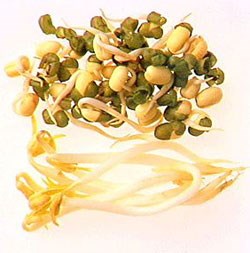NEWS RELEASE
ONTARIO MINISTRY OF HEALTH AND LONG-TERM CARE
********************* Salmonella outbreak confirmed in Ontario
Public advised to avoid eating mung bean sprouts
TORONTO, Nov. 24 - Dr. Sheela Basrur, Ontario's Chief Medical Officer of Health, today confirmed that Ontario is experiencing an outbreak of salmonella.
Preliminary investigations indicate that the source of the outbreak is mung bean sprouts. The public is being advised to avoid eating mung bean sprouts until the source of this outbreak is confirmed. Since the beginning of November, 266 laboratory-confirmed cases of salmonella have been reported to the Ministry of Health and Long-Term Care.
Normally, 20-25 cases are reported per month at this time of year. "Salmonella can cause serious illness, and in very rare cases death, for the very young, elderly and those with weakened immune systems," said Dr. Basrur. "If you have mung bean sprouts in your fridge, do not eat them. If you have eaten sprouts at home or in a restaurant, and are experiencing illness, contact your physician immediately." Salmonella can spread from person-to-person. If an infected individual has diarrhea and is preparing food for others, caring for young children, elderly or sick people, meticulous hand washing is important to further prevent the spread of illness. The Ministry of Health and Long-Term Care is working with local public health units, the Ontario Ministry of Agriculture, Food and Rural Affairs, the Canadian Food Inspection Agency (CFIA) and the Public Health Agency of Canada to investigate the matter further and confirm the source of the outbreak.
To date, 21 health units are involved in the investigation. Salmonella is a naturally-occurring bacteria found in the intestines of animals, particularly poultry, cattle and swine.
Salmonella can contaminate raw fruits and vegetables, including sprouts, that have been in contact with unclean water, animal manure, or an infected food handler.
Symptoms of salmonella include fever, headache, diarrhea, stomach cramps, nausea and sometimes vomiting.
Symptoms occur 12 to 36 hours after eating contaminated food or water. ******************* BACKGROUNDER What is salmonella?
Salmonella is a bacteria that can cause food-borne infection called Salmonellosis. Symptoms include sudden onset of fever, headache, diarrhea, stomach cramps, nausea and sometimes vomiting. Symptoms usually occur 12 to 36 hours after eating contaminated food or water. How is salmonellosis spread?
Salmonella infection is spread by eating food contaminated by feces of an infected animal or person, or by drinking contaminated water. It can be spread from person-to-person. Proper hygiene and safe food handling are key to preventing food-borne illnesses such as salmonella. Salmonella is found in domestic and wild animals, including poultry, wild birds, swine, cattle, and rodents. Pets such as iguanas, tortoises, turtles, chicks, dogs and cats may harbour the bacteria. Humans are carriers of certain types of salmonella. Outbreaks have been caused by inadequately cooked poultry and poultry products, uncooked or lightly cooked foods containing egg and egg products, raw milk and dairy products including dried milk. Foods have been contaminated with feces from infected food handlers. Salmonella infections have been caused by foods such as meat and poultry products processed or prepared with contaminated utensils or on contaminated work surfaces. Salmonella outbreaks have also been linked to raw fruits and vegetables (including sprouts) and unpasteurized dairy products, like raw milk and raw milk cheeses. Contaminated non-chlorinated water supplies can also cause salmonella infections. Fecal-oral transmission may be the cause when diarrhea is present in infants. How can you prevent salmonellosis?
- thoroughly wash hands before, during and after food preparation - do not prepare food, care for hospitalized patients, the elderly or children if you have diarrhea
- cook ground poultry and poultry pieces to a minimum temperature of 74 degrees C (165 degrees F). Whole poultry must be cooked to 85 degrees C (180 degrees F). Cook other ground meats to 71 degrees C (160 degrees F). Use a probe thermometer to verify cooking temperatures
- place cooked foods on clean surfaces to prevent recontamination - do not leave food at room temperature for longer than two hours - use only pasteurized milk and milk products - do not consume raw eggs or inadequately cooked eggs (over easy, or sunny side up) - do not use raw unpasturized eggs in eggnogs and homemade ice cream - do not use cracked eggs
******************
